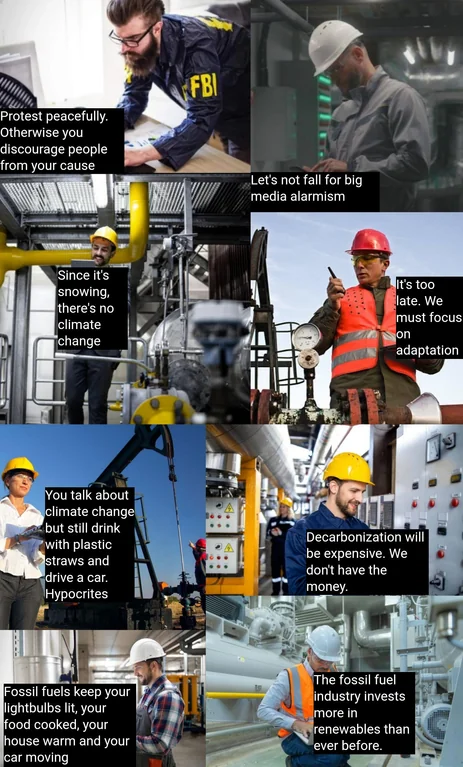UK Prime Minister Keir Starmer has written an op-ed piece in The Sun promising “I will not sacrifice Great British industry to the drum-banging, finger-wagging Net Zero extremists”
Which means he’s willing to sacrifice all the industry to appease the fossil fuels industry.
What good is it to get a labour government if labour is just becoming another conservative party?
becoming
It’s been this way for nearly thirty years. Vote Conservative or vote Slightly-More-Agreeable-Conservative, and with FPTP, your third-party vote may as well have been for Father Christmas for all the difference it will make.
Um…is Father Christmas an option?
The Labour Party stabbed the miners in the back in 1984: it’s not becoming, it is.
This man should be tarred and feathered and strung up in the town square for all to see
Another asshole that wants us to go extinct for profit, UK citizens I think it’s time for you to follow the French and remove this man
The issue with fighting climate change is that it’s a game of chicken between all the countries. If the UK goes all out and eliminates all emissions (at the cost of some portion of its economy) but every other country stays the course, then climate change just carries on and the UK’s sacrifice is in vain.
Similarly, if every other country in the world buckles down and stops climate change but the UK carries on, the UK ends up ahead. This means there is a double disincentive to cooperate on climate change.
Canada is going through this issue right now. The Liberal government has gone forward with carbon taxes and now these policies have become deeply unpopular. The Liberal party is now staring down the barrel of a potentially historic defeat in the upcoming election next year.
Countries that fail to invest in new technologies like solar and batteries will be left behind economically. Their investment in fossil fuels is going to be worth less and less, and they will have nothing to replace it with.
But, we are going to prop up large vested fossil fuel interests as long as possible, of course.
Yes, this is clear enough in the long run. But the question is: will the transition happen fast enough to prevent a climate change catastrophe?
If we don’t avoid the climate change catastrophe, then current investments are going to be even less valuable than if we do. That’s no argument for continuing to prop up those industries.
I have a feeling that the fossil-fuel investors, to the extent that they trouble their pretty heads about it at all, think that, so long as they make enough money now, they can just run really good air conditioning and it won’t affect them. Idiots.
Isn’t it less of a game of a chicken and closer to a global Prisoners Dilemma? The best option for everyone is for everyone to do the thing, the best option for individuals is to not do the thing but the worst thing for everyone is to not do the thing?
Yes. Chicken is an example of a prisoner’s dilemma, though with the key difference that it plays out in real time instead of a single instant.
Tragedy of the commons is usually the result of a large group game of chicken/PD.
I don’t think I’ve ever thought of chicken that way… Questioning if I even understand it at all 😂
But yes, you’re right, the whole thing requires everyone to contribute equally for it all to work properly but, since everyone can momentarily benefit more by not, and politics is painfully shortsighted, they won’t do the right thing.
Yes, but countries are starting to implement carbon taxes on trade with each other. So countries that don’t reduce would be tarriffed higher, to counteract this problem.
It is also why most agreements are multinational with targets to be met.
…he wants to have net negative carbon emissions… right /s
This is par for the course for Keir
Lib Dems: “oh for fucks sake, this country is going to be handed to us looking like prophylactic bin of a whorehouse.”
Maybe the so called net zero extremists should do more than just “finger-wagging”.
All you have to do to understand this problem is to think about all the jobs in coal, oil, gas, plastics, slaughter houses, meat processing, and car manufacturing. And all the pensions.
In general, fossil jobs need to go. We can’t get around this fact.
Leftists need to dig deep into history and realize that socialism existed before fossil industry. While abundance sounds great, there is no abundance of means and places to put atmospheric carbon in (sinks). Many carbon sinks are burning and defrosting as we speak.
Fortunately, leftism has a long tradition of managing scarcity. That’s missing from these parties. Example:
Seize the Means of Carbon Removal: The Political Economy of Direct Air Capture , by Andreas Malm and Wim Carton.
The alternative is an aggressive pursuit of sequestration folded into a programme for ‘euthanizing the fossil fuel industry’, in Parenti’s words: and the two could be fully unified in one act. Private producers of fossil fuels could be nationalised and converted into organisations for capture and storage. This would, as Buck has argued, be the most logical solution: compelling the polluters to clean up their own mess; making good use of their geological and chemical expertise; transferring workers in a doomed industry to new jobs, without having them move one mile. The company formerly known as ExxonMobil: a public utility for drawing down all the emissions it has caused and then some.147
A similar policy needs to come for the automobile industry. The apostles of DAC often calculate that 10 or 20 million DAC machines should be manufactured every year and argue that this is entirely within the realm of the feasible, since more than 70 million cars – devices of comparable size and sophistication – are turned out annually from the world’s factories. But the contention would be more credible if it came with the proposal that one fourth of the automobile industry be converted to DAC manufacturing (and the rest to other segments of the transition).148 The state could force the pace of development by acquiring the secrets from start-ups. It could open the valves of funding to improve the tech – yes, Manhattan Project-style – at maximum speed. Only the state could navigate the minefield of DAC energy and resource requirements and prevent unconscionable trade-offs. But most importantly, it is difficult to see any other actor that could release DAC from ‘the universal domination of mankind by exchange-value’ and let it work for something to which no such value can attach: a stable climate for all, impossible to bring to the market in a shining green bottle or white shoe.149 States could supplement DAC with other forms of drawdown, provided these are compatible with progressive ambitions – natural forest regeneration on land taken from the hands of the meat industry, for instance. For the time being, however, it appears that direct air capture, mineralisation and sequestration could be an important part of removal. After zero-emissions, this process can start lifting the burden, stone after incremental stone, let the earth go free and heal the wounds to the best of its ability. But best-case scenarios are, of course, in very short supply in this overheating world. That is why the politics of carbon dioxide removal will be defining for decades to come.
And a discussion on YouTube: The Imperial Mode of Living - Ulrich Brand & Markus Wissen, comments by Lucas Poy
Bonus meme:
“
PeaceProsperity for our time!”And no prosperity for the time that comes after it.
Every now and then I find this cathartic to watch: https://www.youtube.com/watch?v=PyQGrq-Y7gg
Mainstream politicians cannot afford to tank the economy or they are soon out of a job.
How can they achieve net zero without regular folks losing their jobs? It’s hard to put into practice.
You can’t just make and sell cars as a superior mode of transportation and propose policy that effectively is net zero horses as human and cargo transport. Think of all the ferriers, oat farmers, and veterinarians that would put out of a job.
If you proposed to ban horses in 1904 you’d get laughed out of parliament.
Democratically elected politicians don’t have the ability to impose top-down policies opposed by the people who elected them.
And yet, somehow, this doesn’t stop surveillance bills?
It’s really not that hard. It might take time but wind and solar (plus battery backup) are already the cheapest forms of energy. And not doing it is going to be way more expensive. The UK already gets the remnants of Atlantic hurricanes. Have fun dealing with them not being remnants. Or if the AMOC collapses and it’s 30°C colder in parts of Europe.
We already have the technology to get there. It’ll take time/money to manufacture and deploy it but the UK could probably cover its energy needs with wind alone. Sorry if that means BP goes under but they had an oil spill near where I live so zero pity from me.
This is a lot more complicated. The jobs in the oil and gas industry are well paid and will be hard to replace for a number of communities. A refinery creates a lot of union jobs, with great pay for example. Combustion engines also provide more jobs then electric drive trains. So fewer jobs in the car industry. Also companies like Rolls Royce. It is hard to find a replacement for jet engines, which can do something similar. Airbus in general is a big employer in the UK, especially with the entire supply chain.
That is just some stuff coming to mind. It really is not that simple. Obviously there are new green jobs created, but those jobs are not necessarily in the same places, as the old fossil fuel ones.









